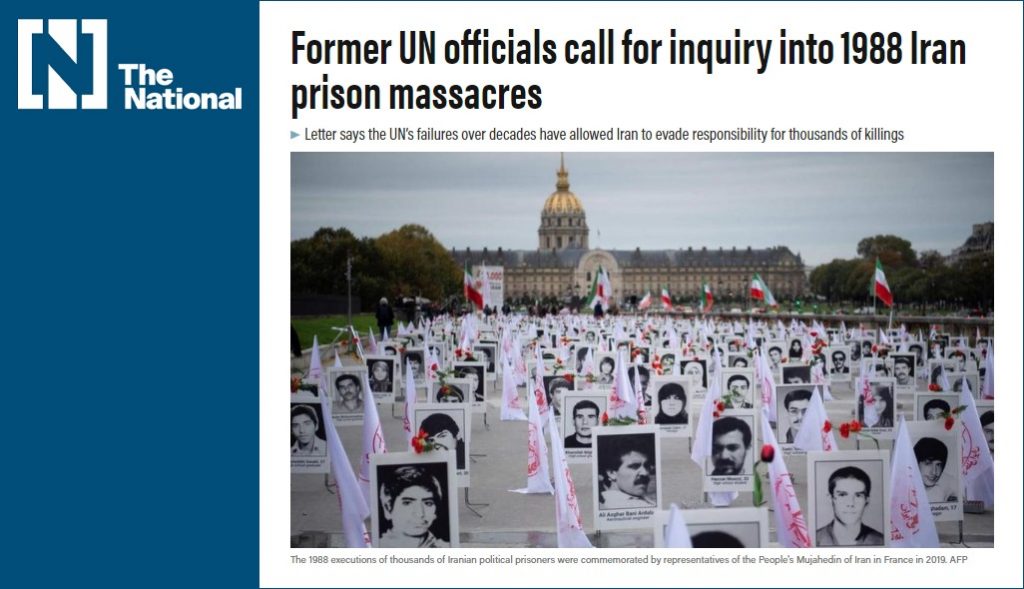More than 40 former United Nations officials including an ex-human rights chief have called for an international inquiry into the 1988 massacre of thousands of prisoners in Iranian jails, The National reported on 5 May 2021.
The following is the full text of The National’s coverage of the open letter to the UN co-signed by JVMI:
Former UN Officials Call For Inquiry Into 1988 Iran Prison Massacres
Letter says the UN’s failures over decades have allowed Iran to evade responsibility for thousands of killings
The National
Paul Peachey
May 5, 2021
More than 40 former United Nations officials including an ex-human rights chief have called for an international inquiry into the 1988 massacre of thousands of prisoners in Iranian jails.
The ex-officials, politicians and legal experts urged the UN to act robustly to end the “culture of impunity” for Iran over the killing of thousands of opposition-linked inmates in 32 cities at the end of the Iran-Iraq war.
In an open letter to Michelle Bachelet, the UN human rights commissioner, more than 150 signatories called for a UN-backed international commission of inquiry into the executions ordered by former Iranian supreme leader Ayatollah Ruhollah Khomeini.
The UN Human Rights Council has set up 33 inquiries since 2006 to investigate serious human rights violations. They have included investigations in Gaza, Libya and Syria, where a decade of evidence-gathering has translated into criminal cases in Europe, said officials.
The mandates of the missions have included establishing the facts behind killings and potential war crimes and identifying those responsible.
“The failure to act now will only embolden the regime to continue its cover-up and evade accountability,” said former UN human rights official Tahar Boumedra, who signed the letter.
“Nothing has happened and the Iranian regime has taken advantage.”
The letter follows Iran’s failure to respond to a letter written by a group of seven UN human rights experts in September last year.
The seven demanded answers from the regime, including over the locations of the graves of those killed and death certificates. Relatives and campaigners seeking answers have been harassed and abused, they said.
The seven said the failure of the UN to act after the massacres had allowed Iran to “conceal the fate of the victims and to maintain a strategy of deflection and denial.”
The experts, including Agnes Callamard, the UN’s former special rapporteur on extrajudicial executions, said they would push for an international commission of inquiry if Iran failed to respond within 60 days. Iran did not respond, according to the UN.
Amnesty International, now headed by Ms Callamard, backed calls for a UN-led inquiry into the events of more than 30 years ago.
Any inquiry would require the backing of the majority of the 47 nations on the Human Rights Council. Iran is not on the council.
Iran researcher Raha Bahreini said given the “prevailing climate of systematic impunity in Iran” there was an urgent need to “set up a mechanism for gathering and analysing evidence of past and ongoing crimes against humanity in Iran, including those related to the 1988 prison massacres”.
“Those against whom there is evidence of direct involvement with these crimes continue to hold top positions of power,” she added. “They include the current head of the judiciary and minister of justice, whose roles are vital for the pursuit of justice.”
The new letter seeking to put pressure on the UN to act was signed by figures including one of Ms Bachelet’s predecessors, former Irish president Mary Robinson.
Other signatories include Geoffrey Robertson, the human rights lawyer who wrote a 2011 report which found that 5,000 inmates allied to the Mujahideen-e-Khalq opposition group had been killed within weeks of the issue of the supreme leader’s fatwa.
The group had backed the overthrow of the Shah but then became the implacable foe of the regime after hundreds of its members were killed at a 1981 rally.
The failure of the UN to act has led to activists and lawyers working together to attempt to secure justice for those killed.
Hamid Nouri, an Iranian lawyer accused of involvement in the “death committees” that organised the killings, is expected to stand trial this summer in Sweden after exiles compiled a dossier on his alleged crimes.
Mr Nouri, who denies wrongdoing, was arrested in 2019 under the principal of universal jurisdiction that allows Sweden to put anyone on trial for crimes against humanity wherever in the world they are committed.
One group – Justice for Victims of the 1988 Massacre in Iran (JVMI) – said it had collated a list of 96 people who were members of the death committees or supervised their operations.

